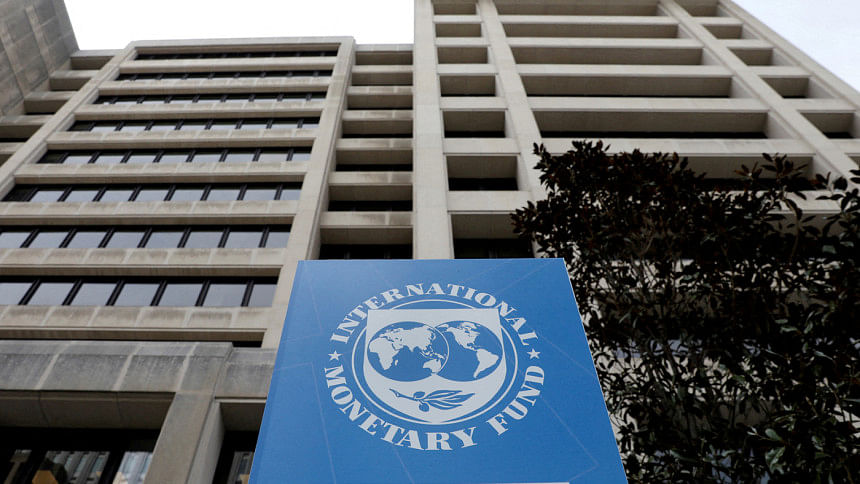Talks with IMF: Consensus likely on exchange rate, revenue issues

Key differences with the International Monetary Fund on revenue generation and exchange rate policies have narrowed during the ongoing discussions in Washington DC, in a development that is likely to trigger the release of the fourth and fifth instalments of the $4.7 billion loan.
"We are in dialogue and nearing a consensus," said Finance Adviser Salehuddin Ahmed, who is leading the Bangladesh side in the talks, according to the video statement issued by Golam Mortuza, the press minister in Washington DC.
The fourth tranche of the instalment was deferred due to disagreements and now talks are going on to release two tranches at once.
Since Saturday, the delegation has been engaged in a series of meetings with IMF officials, including Deputy Managing Director Nigel Clarke.
Multiple sessions have been held to address sticking points in the loan programme, The Daily Star has learnt from people involved with the proceedings.
Prior to the Washington visit, an IMF delegation concluded a two-week mission to Dhaka on April 17, which ended without a staff-level agreement.
Disagreements persisted over the flexibility of the exchange rate and measures to raise Bangladesh's chronically low revenue-to-GDP ratio.
The IMF has called for a clearer path to revenue reform and urged greater flexibility in the exchange rate. It has also recommended structural reforms at the National Board of Revenue (NBR), including separating policy formulation from implementation.
Visiting officials said the IMF cautioned against Bangladesh making reform commitments without implementation, referring to past instances where promised changes were delayed or not enacted.
However, Bangladesh has expressed reservations about moving to a fully market-based exchange rate at this point.
"The current situation is different from the past. The regime has changed, and we are committed to reforms — possibly more than the IMF," Ahmed said.
Due to the ongoing reforms, foreign reserves and remittance inflows have improved and inflation has declined, he said.
Bangladesh Bank Governor Ahsan H Mansur, who is part of the delegation, echoed the commitment to reforms, stating that the interim government is more eager to implement changes than even the IMF.
"Our primary goal is to speed up reforms and hand over a stable economy to the next elected government. We are working closely with the IMF, World Bank and ADB to that end," he said in a separate statement.
He expressed hope that most of the reforms would be completed within the next 12 months.
On the IMF's quarterly targets, he pointed out that the current administration has met every foreign currency reserve target since September -- a feat the previous government had struggled with.
Lutfey Siddiqi, special envoy on international affairs to the chief adviser, stressed that the push for reform is domestic and not externally imposed.
"Let's not paint the IMF as a villain. These reforms are not being forced -- they are necessary and driven by our own needs for resilience," he said.
The Bangladesh delegation also met with officials from the US Treasury Department to discuss a range of issues, including tariffs imposed by US President Donald Trump and complications surrounding repayments for the Rooppur nuclear power plant project.
Due to international sanctions on Russia following its invasion of Ukraine, around $900 million owed to Moscow has accumulated in an escrow account held by Bangladesh Bank. Officials indicated that the matter would require further discussion.
The delegation is scheduled to continue meetings in Washington through next Saturday.


 For all latest news, follow The Daily Star's Google News channel.
For all latest news, follow The Daily Star's Google News channel. 





Comments